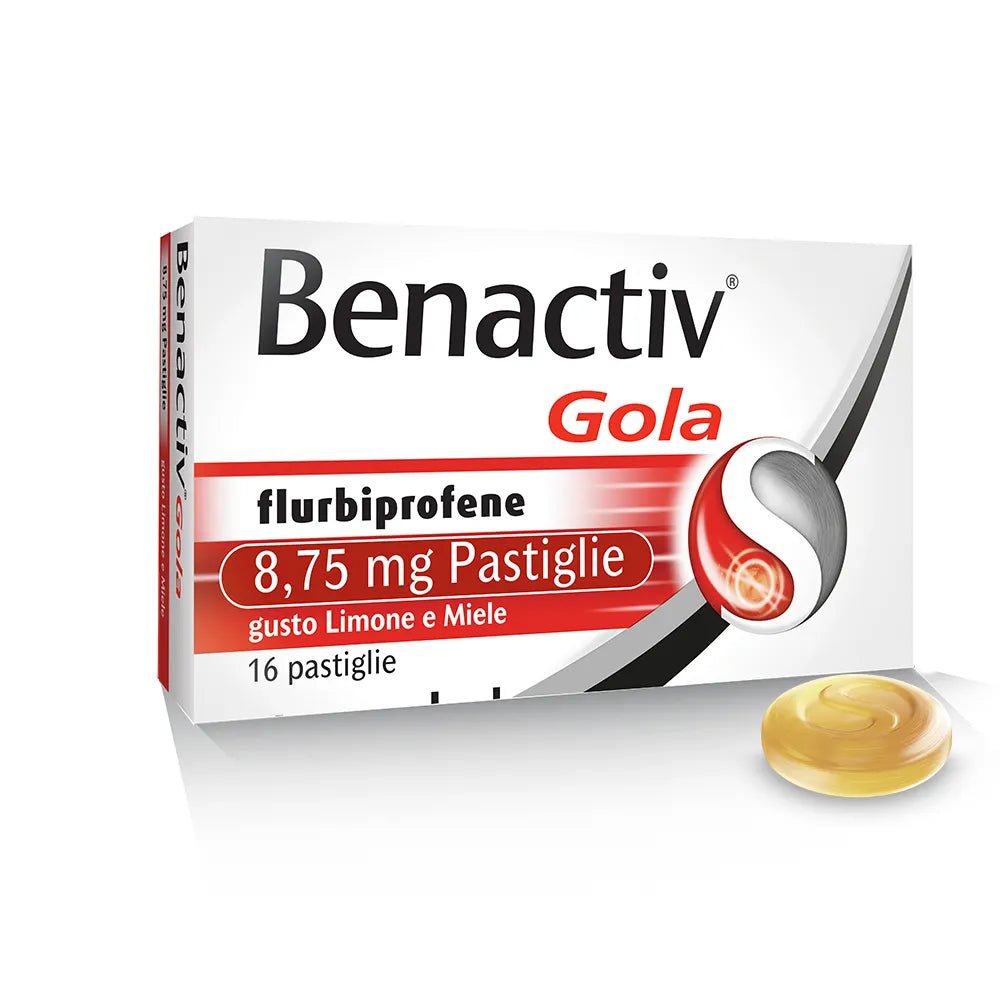Benactiv Gola Miele Limone is an over-the-counter analgesic medicine based on flurbiprofen indicated to relieve sore throat and associated cough , providing long-lasting relief for up to 6 hours.
Benactiv Gola Miele Limone combines flurbiprofen, an active analgesic and anti-inflammatory ingredient, with the emollient action of a lozenge. It penetrates from the surface to the deepest layers of the throat tissue and fights irritative-inflammatory conditions of the oropharyngeal cavity , also associated with pain , such as gingivitis , pharyngitis and stomatitis .
Benactiv Gola Miele Limone does not contain gluten and can also be taken by celiac subjects.
ACTIVE INGREDIENTS
Active ingredients contained in Benactiv Gola Honey Lemon 16 Pastilles - What is the active ingredient in Benactiv Gola Honey Lemon 16 Pastilles?
BENACTIV GOLA Mouthwash 100 ml of mouthwash contain: active ingredient: flurbiprofen 250 mg Excipients with known effects: hydrogenated castor oil-40-polyoxyethylene, methyl parahydroxybenzoate, propyl parahydroxybenzoate BENACTIV GOLA Spray for oral mucosa 100 ml of solution contain: active ingredient: flurbiprofen 250 mg Excipients with known effects: hydrogenated castor oil-40-polyoxyethylene, methyl parahydroxybenzoate, propyl parahydroxybenzoate BENACTIV GOLA Lemon and Honey flavour lozenges One lozenge contains: active ingredient: flurbiprofen 8.75 mg Excipients with known effects: glucose, sucrose BENACTIV GOLA Sugar-free lozenges Orange flavour One lozenge contains: active ingredient: flurbiprofen 8.75 mg Excipients with known effects: sunset yellow (E110), maltitol syrup, isomaltose For the full list of excipients, see section 6.1.on sale online at farmaciadelcorso.net
EXCIPIENTS
Composition of Benactiv Gola Honey Lemon 16 Lozenges - What does Benactiv Gola Honey Lemon 16 Lozenges contain?
BENACTIV THROAT Mouthwash Glycerol, ethyl alcohol, sorbitol 70, hydrogenated castor oil-40-polyoxyethylene, sodium hydroxide, sodium saccharinate, methyl parahydroxybenzoate, propyl parahydroxybenzoate, mint essence, patent blue V (E131), purified water. BENACTIV THROAT Oral mucosa spray Glycerol, ethyl alcohol, sorbitol 70, hydrogenated castor oil-40-polyoxyethylene, sodium hydroxide, sodium saccharinate, methyl parahydroxybenzoate, propyl parahydroxybenzoate, mint essence, patent blue V (E131), purified water. BENACTIV THROAT Lemon and Honey Flavored Lozenges Sucrose, glucose, macrogol 300, potassium hydroxide, lemon flavoring, menthol, honey. For sale online at farmaciadelcorso.net BENACTIV THROAT Sugar-Free Lozenges Orange Flavor Macrogol 300, potassium hydroxide, orange flavoring, levomenthol, acesulfame K, E110, maltitol syrup, isomaltose.
DIRECTIONS
Therapeutic indications Benactiv Gola Honey Lemon 16 Pastilles - Why is Benactiv Gola Honey Lemon 16 Pastilles used? What is it for?
BENACTIV THROAT Mouthwash BENACTIV THROAT Spray for oral mucosa Symptomatic treatment of irritative-inflammatory conditions also associated with pain in the oropharyngeal cavity (e.g. gingivitis, stomatitis, pharyngitis), also as a result of conservative or extractive dental therapy. BENACTIV THROAT Lemon and Honey flavour lozenges BENACTIV THROAT Sugar-free lozenges Orange flavour Symptomatic treatment of irritative-inflammatory conditions also associated with pain in the oropharyngeal cavity (e.g. for sale online at farmaciadelcorso.net gingivitis, stomatitis, pharyngitis).
CONTRAINDICATIONS SIDE EFFECTS
Contraindications Benactiv Gola Honey Lemon 16 Lozenges - When should Benactiv Gola Honey Lemon 16 Lozenges not be used?
Do not use the medicine in children under 12 years of age. Flurbiprofen is contraindicated in patients with known hypersensitivity to flurbiprofen or to any of the excipients listed in section 6.1. Patients who have previously shown hypersensitivity reactions (e.g. asthma, urticaria, allergy, rhinitis, angioedema, bronchospasm) to ibuprofen, acetylsalicylic acid (aspirin) or other nonsteroidal anti-inflammatory drugs (NSAIDs). Flurbiprofen is also contraindicated in patients with a history of gastrointestinal bleeding or perforation related to previous NSAID therapy.for sale online at farmaciadelcorso.net Flurbiprofen should not be taken by patients with active or history of ulcerative colitis, Crohn's disease, recurrent peptic ulcer or gastrointestinal bleeding (defined as two or more distinct episodes of proven ulceration or bleeding).Flurbiprofen is contraindicated in patients with severe heart failure, severe hepatic failure and renal failure (see section 4.4). Third trimester of pregnancy.
DOSAGE
Quantity and method of taking Benactiv Gola Honey Lemon 16 Pastilles - How to take Benactiv Gola Honey Lemon 16 Pastilles?
Undesirable effects may be minimised by using the lowest effective dose for the shortest duration necessary to control symptoms (see section 4.4). BENACTIV GOLA Mouthwash Dosage Adults: 2-3 rinses or gargles per day with 10 ml (1 measuring spoon) of mouthwash. Paediatric population Children over 12 years of age: as for adults. Children under 12 years of age: do not administer to children under 12 years of age (see section 4.3). Special populations Elderly: the clinical data currently available are limited, therefore no recommendation on posology can be made. The elderly are at increased risk of serious consequences in case of adverse reactions (see section 4.4). Patients with hepatic insufficiency: a dosage reduction is not necessary in patients with mild to moderate hepatic insufficiency. Flurbiprofen is contraindicated in patients with severe hepatic insufficiency (see section 4.3). Patients with renal insufficiency: No dosage reduction is necessary in patients with mild to moderate renal insufficiency. Flurbiprofen is contraindicated in patients with severe hepatic insufficiency (see section 4.3). Method of administration For oropharyngeal use. Rinse or keep in the mouth during gargling for up to 1 minute. Do not swallow. The mouthwash can be used pure or diluted in half a glass of water. BENACTIV GOLA Spray for oral mucosa Dosage Adults: apply one dose (2 sprays) 3 times a day, directed directly at the affected area. Each spray delivers 0.2 ml of solution, equivalent to 0.5 mg of active ingredient. Paediatric population Children over 12 years of age: as for adults. Children under 12 years of age: do not administer to children under 12 years of age (see section 4.3). Special populations Elderly: Currently available clinical data are limited, therefore no recommendation on posology can be made. Elderly are at increased risk of serious consequences in case of adverse reactions (see section 4.4).for sale online at farmaciadelcorso.net Patients with hepatic impairment: No dosage reduction is necessary in patients with mild to moderate hepatic impairment. Flurbiprofen is contraindicated in patients with severe hepatic impairment (see section 4.3). Patients with renal impairment: No dosage reduction is necessary in patients with mild to moderate renal impairment. Flurbiprofen is contraindicated in patients with severe hepatic impairment (see section 4.3).Method of administration For oropharyngeal use. Point the dispenser towards the back of the throat and spray on the affected area. BENACTIV GOLA Lemon and Honey flavour lozenges BENACTIV GOLA Sugar-free lozenges Orange flavour Dosage Adults: 1 lozenge every 3-6 hours, as needed. Do not exceed the dose of 8 lozenges in 24 hours. Paediatric population Children over 12 years of age: as for adults. Children under 12 years of age: do not administer to children under 12 years of age (see section 4.3). Special populations Elderly: the clinical data currently available are limited, therefore no recommendation on the dosage can be made. The elderly have a higher risk of serious consequences in case of adverse reactions (see section 4.4). Patients with hepatic insufficiency: a dosage reduction is not necessary in patients with mild to moderate hepatic insufficiency. Flurbiprofen is contraindicated in patients with severe hepatic insufficiency (see section 4.3). Patients with renal impairment: No dosage reduction is necessary in patients with mild to moderate renal impairment. Flurbiprofen is contraindicated in patients with severe hepatic impairment (see section 4.3). Method of administration For oropharyngeal use. Dissolve slowly in the mouth. As with all lozenges, flurbiprofen lozenges should be moved around the mouth during administration to avoid local irritation. If mouth irritation occurs, treatment should be discontinued.
CONSERVATION
Storage Benactiv Gola Honey Lemon 16 Lozenges - How do you store Benactiv Gola Honey Lemon 16 Lozenges?
Benactiv Gola Sugar Free Lozenges Orange Flavour and Benactiv Gola Lemon and Honey Flavour Lozenges: store at a temperature below 25°C. for sale online at farmaciadelcorso.net
WARNINGS
Warnings Benactiv Gola Honey Lemon 16 Lozenges - About Benactiv Gola Honey Lemon 16 Lozenges it is important to know that:
At the recommended doses, when using the medicinal product in its various pharmaceutical forms, any swallowing does not cause any harm to the patient, as the dose of flurbiprofen is much lower than that commonly used in systemic treatments. Elderly: Elderly patients have an increased frequency of adverse reactions to NSAIDs, especially gastrointestinal bleeding and perforation, which may be fatal. Respiratory disorders Cases of bronchospasm have been reported with flurbiprofen in patients with a history of bronchial asthma or allergies. Flurbiprofen should be used with caution in these patients. Other NSAIDs It is advisable not to combine the medicinal product with other NSAIDs (see section 4.5). Systemic lupus erythematosus (SLE) and mixed connective tissue disease Patients with systemic lupus erythematosus and mixed connective tissue disease may be at increased risk of aseptic meningitis (see section 4.8), however this effect is not usually seen with products intended for limited and short-term use such as flurbiprofen. Cardiac, hepatic and renal impairment The medicinal product should be used with caution in patients with cardiac, renal or hepatic insufficiency. NSAIDs have been reported to cause various forms of nephrotoxicity, including interstitial nephritis, nephrotic syndrome and renal failure. Administration of an NSAID may cause a dose-dependent reduction in prostaglandin formation and precipitate renal failure. Patients at greatest risk of developing this reaction are those with impaired renal function, cardiac impairment, hepatic dysfunction, those on diuretic therapy and the elderly; however, this effect is not usually seen with products intended for limited and short-term use such as flurbiprofen. Cardiovascular and cerebrovascular effects Caution is advised before initiating treatment in patients with a history of hypertension and/or heart failure (discuss with your doctor or pharmacist), as fluid retention, hypertension and oedema have been reported in association with NSAID treatment. Clinical trial and epidemiological data suggest that use of some NSAIDs, particularly at high doses and in long-term treatment, may be associated with a small increased risk of arterial thrombotic events such as myocardial infarction or stroke. There are insufficient data to exclude a similar risk for flurbiprofen. Patients with uncontrolled hypertension, congestive heart failure, established ischaemic heart disease, peripheral arterial disease and/or cerebrovascular disease should only be treated with flurbiprofen after careful consideration. Similar consideration should be made before initiating long-term treatment in patients with risk factors for cardiovascular disease (e.g. hypertension, hyperlipidaemia, diabetes mellitus, smoking). Central nervous system effects Analgesic-induced headache. Headache may occur with prolonged or inappropriate use of analgesics, which should not be treated by increasing the dose of the medicinal product. Gastrointestinal effects Flurbiprofen should be administered with caution to patients with a history of peptic ulcer and other gastrointestinal diseases as these conditions may be exacerbated. The risk of gastrointestinal bleeding, ulceration or perforation is higher with increasing flurbiprofen dosage in patients with a history of ulcer, particularly if complicated by haemorrhage and perforation and in the elderly. These patients should start treatment on the lowest available dose. Gastrointestinal bleeding, ulceration or perforation have been reported with all NSAIDs at any time during treatment.for sale online at farmaciadelcorso.net These adverse reactions can be fatal and may occur with or without warning symptoms or in the case of a previous history of serious gastrointestinal reactions. Patients with a history of gastrointestinal disease, particularly when elderly, should report any unusual abdominal symptoms (especially gastrointestinal bleeding) in the early stages of treatment. Undesirable effects may be minimised by using the lowest effective dose for the shortest duration necessary to control symptoms (see section 4.2). Caution should be advised in patients receiving concomitant medications which could increase the risk of ulceration or bleeding, such as oral corticosteroids, anticoagulants such as warfarin, selective serotonin reuptake inhibitors or anti-platelet agents such as acetylsalicylic acid (see section 4.5). When gastrointestinal bleeding or ulceration occurs in patients receiving flurbiprofen, the treatment should be discontinued. Dermatological effects Use of the medicinal product, especially if prolonged, may give rise to sensitisation or local irritation phenomena. In such cases, treatment should be discontinued and a doctor should be consulted to institute appropriate therapy if necessary. Serious skin reactions, some of them fatal, including exfoliative dermatitis, Stevens-Johnson syndrome, and toxic epidermal necrolysis, have been reported very rarely in association with the use of NSAIDs (see section 4.8). Flurbiprofen should be discontinued at the first appearance of skin rash, mucosal lesions, or any other sign of hypersensitivity. Infections Since isolated cases of exacerbation of infection-related inflammation (e.g. development of necrotising fasciitis) have been described in temporal association with systemic use of NSAIDs, patients are advised to seek immediate medical attention if signs of bacterial infection appear or worsen during flurbiprofen therapy. The possibility of initiating antibiotic therapy should be considered. If mouth irritation develops, treatment should be discontinued. BENACTIV GOLA Mouthwash and BENACTIV GOLA Spray contain para-hydroxy-benzoates which can cause delayed allergic reactions, such as contact dermatitis; more rarely they can cause immediate reactions, with urticaria and bronchospasm. BENACTIV GOLA Lemon and Honey flavoured lozenges contain 1.069 g of glucose and 1.407 g of sucrose per lozenge. Not recommended in hereditary fructose intolerance, glucose-galactose malabsorption syndrome or sucrase-isomaltase insufficiency. BENACTIV GOLA Sugar-Free Lozenges Orange flavour is instead indicated for those patients who need to control their sugar and calorie intake. BENACTIV GOLA Sugar-Free Lozenges Orange flavour contains the colouring E110 which can cause allergic reactions. Do not use for prolonged treatments exceeding 7 days. If you do not see any noticeable results after 3 days of treatment, the cause may be a different medical condition. In such cases, it is advisable to consult your doctor.
INTERACTIONS
Interactions Benactiv Gola Miele Limone 16 Pastiglie - Which medicines or foods can modify the effect of Benactiv Gola Miele Limone 16 Pastiglie?'
Caution should be exercised in patients treated with any of the following medicinal products, as interactions have been reported in some patients. Inform your doctor if you are taking other medicinal products. Flurbiprofen should be avoided in combination with: - Aspirin: unless low dose aspirin (not exceeding 100 mg/day or local prophylactic doses for cardiovascular protection) has been recommended by your doctor; as with other NSAID-containing medicinal products, concomitant administration of flurbiprofen and aspirin is generally not recommended due to the potential for increased adverse effects (see section 4.4). - Cox-2 inhibitors and other NSAIDs: Concomitant use of other NSAIDs, including cyclooxygenase-2 selective inhibitors, should be avoided due to potential additive effects and an increased risk of adverse reactions (see section 4.4). for sale online at farmaciadelcorso.net Flurbiprofen should be used with caution in combination with: - Anticoagulants: NSAIDs may enhance the effects of anticoagulants such as warfarin (see section 4.4) - Antiplatelet agents: increased risk of gastrointestinal bleeding - Selective serotonin reuptake inhibitors (SSRIs): increased risk of gastrointestinal bleeding - Antihypertensives (diuretics, ACE inhibitors and angiotensin II antagonists): NSAIDs may reduce the effect of diuretics. Other antihypertensive drugs may potentiate nephrotoxicity caused by inhibition of cyclooxygenase, especially in patients with impaired renal function (these patients should be adequately hydrated) - Alcohol: may increase the risk of adverse reactions, especially bleeding in the gastrointestinal tract - Cardiac glycosides: NSAIDs may exacerbate cardiac failure, reduce GFR (glomerular filtration rate) and increase plasma glycoside levels - Ciclosporin: increased risk of nephrotoxicity - Corticosteroids: increased risk of gastrointestinal ulceration or haemorrhage with NSAIDs (see section 4.4) - Lithium: there is evidence of a possible increase in lithium plasma levels - Methotrexate: there may be an increase in methotrexate plasma levels - Mifepristone: NSAIDs should not be used for 8-12 days after mifepristone administration, as NSAIDs may reduce the effect of mifepristone. mifepristone - Quinolone antibiotics: Animal data indicate that NSAIDs may increase the risk of convulsions associated with quinolone antibiotics. Patients taking NSAIDs and quinolones may be at increased risk of developing convulsions - Tacrolimus: possible increased risk of nephrotoxicity when NSAIDs are given with tacrolimus - Zidovudine: increased risk of haematological toxicity when NSAIDs are given with zidovudine.
SIDE EFFECTS
Like all medicines, Benactiv Gola Miele Limone 16 Pastiglie can cause side effects - What are the side effects of Benactiv Gola Miele Limone 16 Pastiglie?
Hypersensitivity reactions to NSAIDs have been reported and may consist of: (a) non-specific allergic reactions and anaphylaxis (b) respiratory tract reactivity, e.g. asthma, aggravated asthma, bronchospasm, dyspnoea (c) various skin disorders, including e.g. rashes of various types, pruritus, urticaria, purpura, angioedema and, more rarely, exfoliative and bullous dermatoses (including epidermal necrolysis and erythema multiforme). The most commonly observed adverse reactions are gastrointestinal in nature. Local use of the medicinal product, especially if prolonged, may give rise to sensitization or local irritation phenomena. Dissolution of the medicinal product in the oral cavity in tablet form may be accompanied by sensations of heat or tingling in the oropharynx. In such cases, treatment should be discontinued and, if necessary, appropriate therapy instituted. The following undesirable effects have been reported, particularly after administration of systemic formulations. These refer to those observed with the use of flurbiprofen used short-term and at doses compatible with the classification of over-the-counter medicines. In case of treatment of chronic conditions and for long periods of time, additional side effects may occur.for sale online at farmaciadelcorso.net The side effects associated with the use of flurbiprofen are divided below according to the classification by systems and organs and by frequency. The frequency is defined as: very common (≥ 1/10), common (≥1/100, <1/10), uncommon (≥1/1,000, <1/100), rare (≥1/10,000, <1/1,000), very rare (<1/10,000) and not known (the frequency cannot be estimated from the available data). Within each frequency grouping, side effects are reported in order of decreasing seriousness.
Reporting of suspected adverse reactions Reporting suspected adverse reactions that occur after authorisation of the medicinal product is important. It allows continued monitoring of the benefit/risk balance of the medicinal product. Healthcare professionals are asked to report any suspected adverse reactions via the national reporting system at www.agenziafarmaco.in vendita online su farmaciadelcorso.net gov.it/content/come-segnalare-una-sospetta-reazione-avversa
: Considering the low content of active ingredient and its local use, it is unlikely that overdose situations may occur. Symptoms The majority of patients who ingest clinically important quantities of NSAIDs develop nausea, vomiting, gastrointestinal irritation, epigastric pain, or more rarely diarrhea. Tinnitus, headache and gastrointestinal bleeding are also possible. In more severe cases of NSAID intoxication, central nervous system toxicity is observed, manifested by drowsiness, occasionally excitability, blurred vision and disorientation or coma. Occasionally patients develop convulsions. In case of severe NSAID intoxication, metabolic acidosis may occur and the prothrombin time/INR may be prolonged, probably due to interference with the action of circulating clotting factors. Acute renal failure and liver damage may occur. for sale online at farmaciadelcorso.net An exacerbation of asthma is possible in asthmatic subjects. Treatment Treatment should be symptomatic and supportive and should include maintaining a patent airway and monitoring cardiac function and vital signs until stable. Oral administration of activated charcoal and, if necessary, correction of serum electrolytes should be considered if the patient presents within 1 hour of ingestion of a potentially toxic amount. Seizures should be treated with intravenous diazepam or lorazepam if frequent or prolonged. Bronchodilators for asthma should be administered. There is no specific antidote for flurbiprofen.
PREGNANCY AND BREASTFEEDING
If you are pregnant or breast-feeding, think you may be pregnant or are planning to have a baby, ask your doctor for advice before taking Benactiv Gola Miele Limone 16 Pastiglie.
Pregnancy Flurbiprofen should not be administered during the first and second trimester of pregnancy unless clearly necessary. The use of flurbiprofen during the third trimester of pregnancy is contraindicated. Breastfeeding In a limited number of studies, flurbiprofen appears in breast milk at very low concentrations and is unlikely to have any adverse effects on the breast-fed infant. However, administration of flurbiprofen is not recommended in nursing mothers.for sale online at farmaciadelcorso.net Fertility There is evidence that cyclooxygenase/prostaglandin synthesis inhibitors may cause impairment of female fertility by an effect on ovulation. This is reversible upon discontinuation of treatment.
























